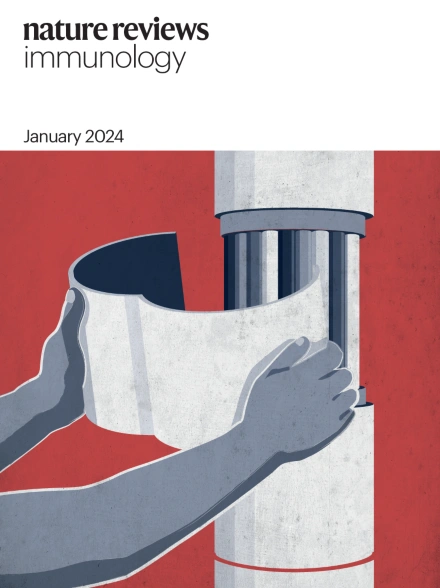In vivo CAR engineering for immunotherapy
IF 60.9
1区 医学
Q1 IMMUNOLOGY
引用次数: 0
Abstract
Chimeric antigen receptor (CAR)-engineered immune cell therapy represents an important advance in cancer treatments. However, the complex ex vivo cell manufacturing process and stringent patient selection criteria curtail its widespread use. In vivo CAR engineering is emerging as a promising off-the-shelf therapy, providing advantages such as streamlined production, elimination of patient-specific manufacturing, reduced costs and simplified logistics. A large set of preclinical findings has inspired further investigation into treatments for hard-to-treat diseases such as solid tumours and has facilitated the development of advanced products to enhance in vivo CAR engineering efficacy, the persistence of the cellular therapeutic and safety. In this Review, we summarize current in vivo CAR engineering strategies, including nanoparticle-based and viral delivery systems as well as bioinstructive implantable scaffolds, and discuss their advantages and disadvantages. Additionally, we provide a systematic comparison between in vivo and conventional ex vivo CAR engineering methods and address the challenges and future prospects of in vivo CAR engineering. In vivo chimeric antigen receptor (CAR) engineering has emerged as a promising off-the-shelf therapeutic approach for hard-to-treat diseases such as solid tumours, offering key advantages such as streamlined production, the elimination of patient-specific manufacturing, reduced costs and simplified logistics. In this Review, Yang and colleagues provide an overview of current in vivo CAR engineering strategies, highlighting existing challenges and discussing future directions for the field.


用于免疫治疗的体内CAR工程
嵌合抗原受体(CAR)工程免疫细胞治疗是癌症治疗的重要进展。然而,复杂的体外细胞制造过程和严格的患者选择标准限制了其广泛使用。体内CAR工程正在成为一种很有前途的现成疗法,它具有诸如简化生产、消除针对患者的制造、降低成本和简化物流等优点。大量的临床前研究结果激发了对难以治疗的疾病(如实体肿瘤)治疗方法的进一步研究,并促进了先进产品的开发,以提高体内CAR工程的疗效、细胞治疗的持久性和安全性。在这篇综述中,我们总结了目前的体内CAR工程策略,包括基于纳米颗粒和病毒的递送系统以及生物指导性植入支架,并讨论了它们的优缺点。此外,我们提供了体内和传统的离体CAR工程方法之间的系统比较,并解决了体内CAR工程的挑战和未来前景。
本文章由计算机程序翻译,如有差异,请以英文原文为准。
求助全文
约1分钟内获得全文
求助全文
来源期刊

Nature Reviews Immunology
医学-免疫学
CiteScore
93.40
自引率
0.40%
发文量
131
审稿时长
6-12 weeks
期刊介绍:
Nature Reviews Immunology is a journal that provides comprehensive coverage of all areas of immunology, including fundamental mechanisms and applied aspects. It has two international standard serial numbers (ISSN): 1474-1733 for print and 1474-1741 for online. In addition to review articles, the journal also features recent developments and new primary papers in the field, as well as reflections on influential people, papers, and events in the development of immunology. The subjects covered by Nature Reviews Immunology include allergy and asthma, autoimmunity, antigen processing and presentation, apoptosis and cell death, chemokines and chemokine receptors, cytokines and cytokine receptors, development and function of cells of the immune system, haematopoiesis, infection and immunity, immunotherapy, innate immunity, mucosal immunology and the microbiota, regulation of the immune response, signalling in the immune system, transplantation, tumour immunology and immunotherapy, and vaccine development.
 求助内容:
求助内容: 应助结果提醒方式:
应助结果提醒方式:


